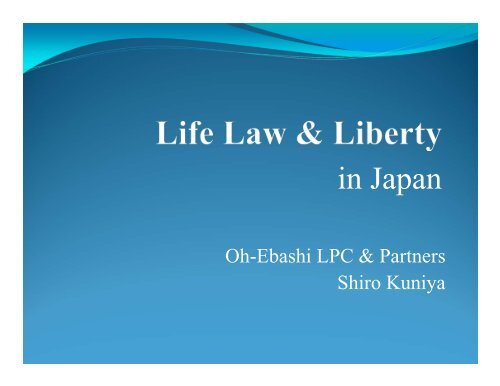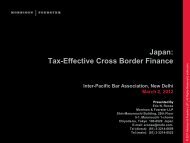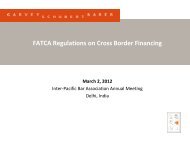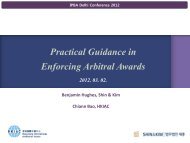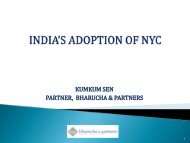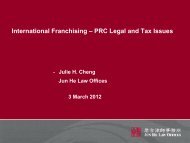Life, Law & Liberty in Japan - IPBA 2012
Life, Law & Liberty in Japan - IPBA 2012
Life, Law & Liberty in Japan - IPBA 2012
You also want an ePaper? Increase the reach of your titles
YUMPU automatically turns print PDFs into web optimized ePapers that Google loves.
<strong>in</strong> <strong>Japan</strong>Oh-Ebashi LPC & PartnersShiro Kuniya
Table of contentsⅠ Right to <strong>Life</strong>3Ⅱ Personal <strong>Liberty</strong>61, Psychological Freedom2, Economic Freedom3, Physical Freedom4, The Limitation of the Personal <strong>Liberty</strong>Ⅲ To protect Personal <strong>Liberty</strong> 191, Rule of <strong>Law</strong>2, Fight<strong>in</strong>g the Threat to Rule of <strong>Law</strong>Ⅳ Conclusion 2
Ⅰ. Right to <strong>Life</strong>1.Fundamental Human RightsConstitution, Article 11The people shall not be prevented from enjoy<strong>in</strong>g anyof the fundamental human rights. Thesefundamental human rights guaranteed to the peopleby this Constitution shall be conferred upon thepeople of this and future generations as eternal and<strong>in</strong>violate rights.3
Ⅱ. Personal <strong>Liberty</strong>-Psychological(1) Freedom of One’s m<strong>in</strong>d - ThoughtConstitution, Article 19Freedom of thought and conscience shall not beviolated.• If the people have any views of the state, theworld, and the life, these views are absolutelyfree from the power of the state as long as theseare <strong>in</strong> their m<strong>in</strong>ds.7
Ⅱ. Personal <strong>Liberty</strong>-Psychological(1) Freedom of One’s m<strong>in</strong>d - ReligionConstitution, Article 20(1) Freedom of religion is guaranteed to all. No religiousorganization shall receive any privileges from the State,nor exercise any political authority.(2) No person shall be compelled to take part <strong>in</strong> anyreligious act, celebration, rite or practice.(3) The State and its organs shall refra<strong>in</strong> from religiouseducation or any other religious activity.• Religion was separated from the State.• Religious activities prohibited by the constitution arethose which assist, promote, enhance, or suppress<strong>in</strong>terference with religion.8
Ⅱ. Personal <strong>Liberty</strong>-Psychological(1) Freedom of One’s m<strong>in</strong>d -AcademicConstitution, Article 23Academic freedom is guaranteed.• Based on the history that academic freedom and thecontents of academic theories were violated by powerof the state (Case of Professor Takigawa).• This article also guarantees authority <strong>in</strong> a university(Case of Poporo <strong>in</strong> Tokyo University, Judgment of theSupreme Court, May 22,1962)9
Ⅱ. Personal <strong>Liberty</strong>-Psychological(2) Freedom of ExpressionConstitution, Article 21.Freedom of assembly and association as well asspeech, press and all other forms of expression areguaranteed.• The scope is fairly broad, cover<strong>in</strong>g Freedom of assembly, association, press, broadcast<strong>in</strong>g…… Right to know which is regarded as a prerequisite to thefreedom of expression.10
Ⅱ. Personal <strong>Liberty</strong>-Psychological(2) Freedom of Expression• Freedom of expression enjoys the highest ofguarantees, s<strong>in</strong>ce it forms the basis of ademocratic society.• Freedom of the press serves the right to know <strong>in</strong>democratic society because the press providespeople with important <strong>in</strong>formation about nationalpolitics (Case of Hakata Station, Judgment of theSupreme Court, November 26, 1969).11
Ⅱ. Personal <strong>Liberty</strong>2. Freedom of EconomicConstitution, Article 22Every person shall have freedom to choose and change hisresidence and to choose his occupation to the extent thatit does not <strong>in</strong>terfere with the public welfare. Freedom ofall persons to move to a foreign country and to divestthemselves of their nationality shall be <strong>in</strong>violate.Constitution, Article 29The right to own or to hold property is <strong>in</strong>violable.Property rights shall be def<strong>in</strong>ed by law, <strong>in</strong> conformitywith the public welfare. Private property may be takenfor public use upon just compensation therefor.12
Ⅱ. Personal <strong>Liberty</strong>3. Physical FreedomConstitution, Article 18No person shall be held <strong>in</strong> bondage of any k<strong>in</strong>d.Involuntary servitude, except as punishment forcrime, is prohibited.Guarantee of Due Process13
Ⅱ. Personal <strong>Liberty</strong>-Physical freedom(1) Due Process of <strong>Law</strong>Constitution, Article 31No person shall be deprived of life or liberty, norshall any other crim<strong>in</strong>al penalty be imposed,except accord<strong>in</strong>g to procedure established by law.This provisioncovers・・Substantive due processProcedural due process•Not be vague•Should be reasonable•Should be fairThe right to notice and hear<strong>in</strong>g14
Ⅱ. Personal <strong>Liberty</strong>-Physical freedom(2) The Rights of Defendants and SuspectsIn Crim<strong>in</strong>al ProcedureThe Constitution guarantees…• No person shall be apprehended(Article 33)• No person shall be arrested or deta<strong>in</strong>ed(Article 34)• The right of all persons to be secure <strong>in</strong> their homes,papers and effects aga<strong>in</strong>st entries, searches and seizuresshall not be impaired (Article 35)• No person shall be compelled to testify aga<strong>in</strong>st himself(Article 38)The Code of Crim<strong>in</strong>al Procedure was totally amended <strong>in</strong>1948 based on the constitution.15
Ⅱ. Personal <strong>Liberty</strong>-Physical freedom(3) Be Presumed Innocent Until Proven GuiltyCrim<strong>in</strong>al code, Article 336When the case under public prosecution does notconstitute a crime or has not been proven to be acrime, the court shall render a not guilty verdict<strong>in</strong> the judgment.16
Ⅱ. Personal <strong>Liberty</strong>-Public WelfareThe Limitation of Human RightsConstitution, Article 12The freedoms and rights guaranteed to the people by thisConstitution shall be ma<strong>in</strong>ta<strong>in</strong>ed by the constantendeavor of the people, who shall refra<strong>in</strong> from anyabuse of these freedoms and rights and shall always beresponsible for utiliz<strong>in</strong>g them for the public welfare.• When contrary to the basic pr<strong>in</strong>ciple of public welfare,even the right to life is forfeited or legislative restricted(Judgment of Supreme Court, March 12, 1948).17
Ⅱ. Personal <strong>Liberty</strong>-Public WelfareJudicial Precedents•Even the freedom of expression is not guaranteed<strong>in</strong>f<strong>in</strong>itely, it must be limited for the benefit of other <strong>in</strong>terestsby reasonable and unavoidable restrictions (Judgment ofSupreme Court, March 16, 1993).•Freedom of expression and freedom of conscience,require stronger guarantees than economic rights.It is unavoidable that the exercise of freedoms orrights br<strong>in</strong>gs people <strong>in</strong>to conflict with the <strong>in</strong>terestsof others, and that under certa<strong>in</strong> circumstances theserights and freedoms may have to be restricted.18
Ⅲ. To Protect Personal <strong>Liberty</strong>1. Rule of <strong>Law</strong> Rule of Man(1) Respect for the Basic human rights(2) Due process of law(3) The constitution is the supreme lawThis Constitution shall be the supreme law of the nation and nolaw, ord<strong>in</strong>ance, imperial rescript or other act of government, orpart thereof, contrary to the provisions hereof, shall have legalforce or validity(Constitution, Article 98).(4) Respect for the judiciaryThe Supreme Court is the court of last resort with power todeterm<strong>in</strong>e the constitutionality of any law, order, regulation orofficial act(Constitution, Article 81).19
Ⅲ. To Protect Personal <strong>Liberty</strong>2. Fight<strong>in</strong>g the Threat to Rule of <strong>Law</strong>(1) Antisocial ForcesAct on Prevention of Unjust Acts by OrganizedCrime Group Members, Article 1This Act shall take necessary regulations forviolent acts conducted by the gangster thereby it<strong>in</strong>tends to secure the peace and safety of civil life,and to protect the freedoms and rights of citizens.20
Ⅲ. To Protect Personal <strong>Liberty</strong>2. Fight<strong>in</strong>g the Threat to Rule of <strong>Law</strong>(2) CorruptionPenal code, Article 197(1)A public officer who accepts, solicits or promises to accepta bribe <strong>in</strong> connection with his/her duties shall be punished..Unfair Competition Prevention Act, Article 18(1)No person shall give, or offer or promise to give, anymoney or other benefits to a foreign public officer for thepurpose of hav<strong>in</strong>g the foreign public officer act or refra<strong>in</strong>from act<strong>in</strong>g <strong>in</strong> a particular way <strong>in</strong> relation to his/herduties….21
Ⅲ. To Protect Personal <strong>Liberty</strong>2. Fight<strong>in</strong>g the Threat to Rule of <strong>Law</strong>(3) Contempt of Court• No contempt of court <strong>in</strong> <strong>Japan</strong>ese law, but Court Actprovides court rules.Court Act, Article 71(1)The presid<strong>in</strong>g judge or a s<strong>in</strong>gle judge who has opened the sessionshall ma<strong>in</strong>ta<strong>in</strong> order <strong>in</strong> the court.(2) The presid<strong>in</strong>g judge or a judge who has opened the session mayorder any person who <strong>in</strong>terferes with the exercis<strong>in</strong>g of the dutiesof the court or who behaves improperly, to leave the court, andmay issue such other order or take such measures as are necessaryfor the ma<strong>in</strong>tenance of order <strong>in</strong> the court.Court act provides sanction provisions ( Article,73)22
Ⅳ. ConclusionThe mission of an Attorney•Social JusticeAttorney Act, Article 1(1) An Attorney is entrusted with the mission of protect<strong>in</strong>gfundamental human rights and achiev<strong>in</strong>g social justice.(2) An Attorney shall <strong>in</strong> keep<strong>in</strong>g with the mission specifiedset forth <strong>in</strong> the proceed<strong>in</strong>g paragraph, perform his/herduties <strong>in</strong> good faith and endeavor to ma<strong>in</strong>ta<strong>in</strong> the socialorder and to improve the legal system.23


